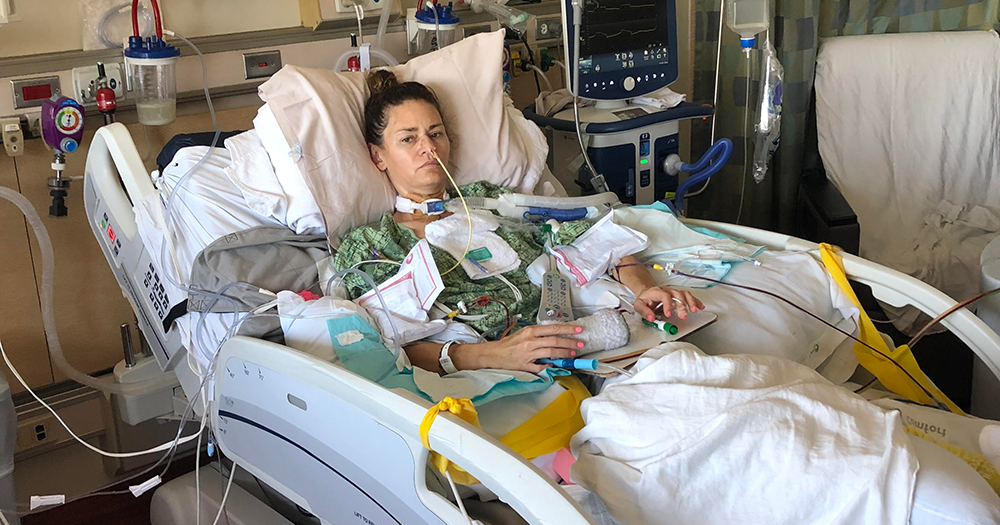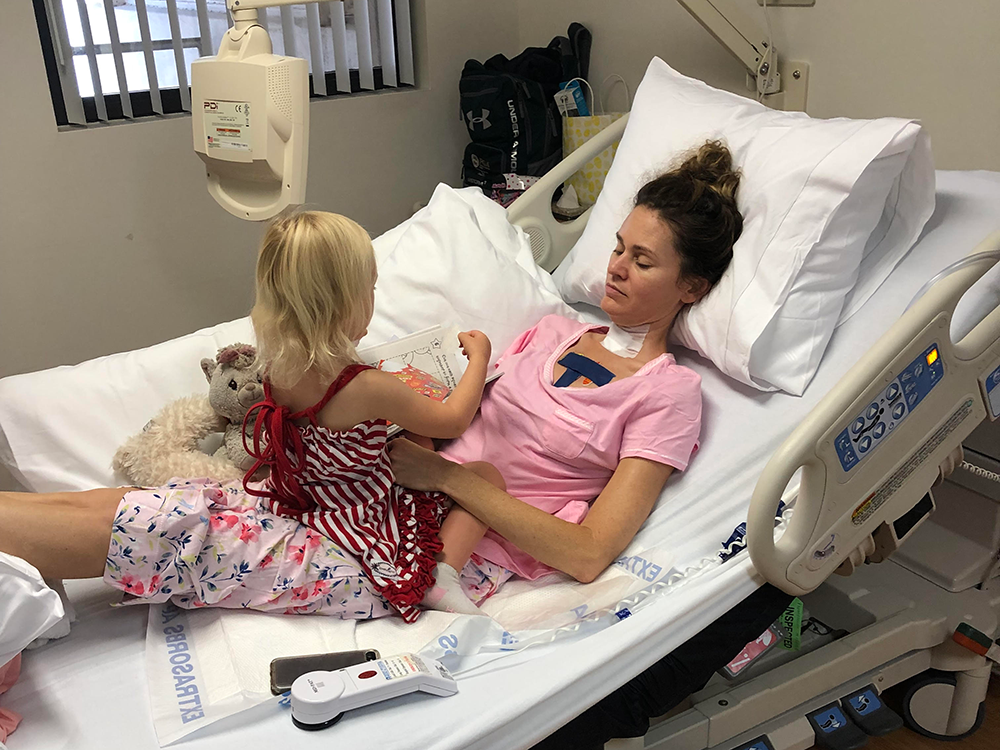When speech pathologist Vanessa Abraham began to feel ill in 2019, she thought she had a bad case of the flu. She was exhausted and her body ached. Her voice was raspy. She was prescribed antibiotics, but they didn’t help.
A week later, Abraham woke up in the middle of the night and tried to stand. She collapsed to the floor, struggling to breathe. Her husband took her to an area hospital, where Abraham was taken to the ICU and intubated. The ventilator helped her breathe but left her unable to speak.
Doctors didn’t know what was causing her symptoms. Two days after being admitted, she was transferred to UC San Diego Health, a larger hospital. That’s where she met Dr. Jared Rosen, then a medical student on an ICU rotation.
While Abraham was in the ICU, doctors suggested multiple diagnoses, but none fit. Even scarier than the lack of answers was her continued intubation. She was unable to speak or eat. She was fighting paralysis that left her unable to move much of her body. Her neck was so weak that she couldn’t raise her head without it flopping like a newborn baby’s, Rosen said.
Vanessa Abraham
“I was very aware of what was going on,” Abraham told CBS News. “It was beyond the worst experience I could have ever imagined myself being in.”
Abraham said the only thing that helped relieve her anxiety during this time was the long hours Rosen would spend at her bedside, doing his best to keep her spirits up. As a medical student, he had fewer responsibilities than other members of her care team and was able to spend more time with Abraham. They also worked to develop communication methods Abraham could use.
After several weeks, Abraham’s symptoms began to improve. She was taken off the ventilator. After a month, she was released from the ICU. But doctors were still no closer to understanding what had caused her paralysis.
“There was no official label or term for what I was having. The fear of not knowing was terrifying,” Abraham said.
Diagnosing a rare form of an unusual condition
After being discharged from the ICU, Abraham still had weakness that left her unable to lift her right arm and made eating difficult, so she spent time in inpatient physical therapy. Even after that, she needed outpatient follow-up, as well as more specialized care like swallowing and voice therapy. She battled severe anxiety and depression. At times, she felt so overwhelmed that she considered taking her own life.
Vanessa Abraham
One night, she searched for Rosen online and found his email address. Abraham wrote and asked if he remembered her. When he responded and said that he did, it “brought tears” to her eyes and “sparked some level of joy” that helped her have hope.
That hope carried her through the next several months.
Finally, four months after her symptoms began, Abraham was diagnosed with a form of Guillain-Barré syndrome, a rare neurological disorder where the fibers around the nerves deteriorate and cause paralysis. In most cases, the paralysis starts in the legs and works its way upwards, according to Dr. Kiril Kiprovski, a neurologist and director of the Division of Neuromuscular Medicine at NYU Langone. Abraham had contracted the condition’s even rarer pharyngeal-cervical-brachial variant, which attacks the muscles in the diaphragm and throat.
The variant is “very difficult to diagnose,” Kiprovski said. There’s no one test to determine if a person has Guillain-Barré syndrome or any of its variants, so doctors rely on clinical presentations. But they may not be familiar with the condition, Kiprovski said, because of its rarity. One person per 78,000 is diagnosed with Guillain-Barré syndrome annually, according to the Cleveland Clinic. Only about 3% of those patients are diagnosed with the pharyngeal-cervical-brachial variant, researchers have found.
People diagnosed with Guillain-Barré syndrome or a variant of it tend to improve on their own, as Abraham did, Kiprovski said. Once Abraham was diagnosed, she was able to start receiving intravenous immunoglobulin treatment, where donor antibodies are given to a patient to strengthen their immune system.
“It takes time”
Abraham continued her slow recovery. Having a name for what was happening to her helped her accept the laborious process.
“I had to accept in my own head that this is going to be something that’s just going to take time,” Abraham said. “And that’s how neuro diseases work. It takes time for your body to regenerate and heal.”
Vanessa Abraham
Six years later, Abraham still has neuromuscular weakness, but can go about much more of her daily routine. She is back at work, where her voiceless experience in the ICU informs her interactions with patients whose speech has been compromised. She spends as much time as possible in the gym, working to strengthen her body. She also stayed in touch with Rosen, who is now finishing a fellowship in critical care medicine at the University of California’s Davis Medical Center. He told CBS News that Abraham’s case inspired him to study that area of medicine.
Abraham’s recovery hasn’t just been physical. She started attending a support group for people who have trauma after time in the ICU. The experience has helped her recover from the fear of those weeks on a ventilator. She has worked to raise awareness for the benefits of such groups. She also wrote a memoir detailing her experience.
“There’s so much more to recovery than just getting strong again,” Abraham said.


